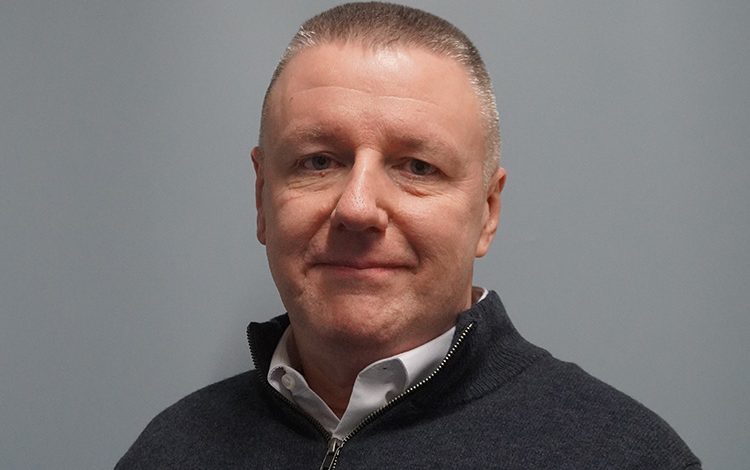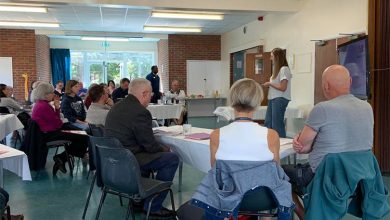Chaplain talks to King’s Lynn Churches Together

Tapping House Hospice Chaplain Rev Brendan Mooney talked to a King’s Lynn Churches Together meeting about psychospiritual care at the end of life, last month. Peter Coates reports.
Brendan has worked in chaplaincy and psychotherapy for 18 years and has recently started as the chaplain at Tapping House Hospice in Hillington.
Palliative care
So what is palliative care? Brendan started by explaining that palliative care aims to make life as comfortable as possible and controlling distressing symptoms for people who have an illness which cannot be cured. The care also involves the provision of psychological, social and spiritual support for the person who may have cancer, heart or respiratory disease, dementia or another neurological disease.
End of life care is support given in the last months of life and this helps people to control their symptoms, live as well as possible and to die with dignity. People at the end of life can suffer from total pain, a complex mixture of physical, psychological, social and spiritual pain. This may include feelings of abandonment, despair, anger and fear.
Spiritual and pastoral care responds to the needs of the spirit when faced with trauma, ill health and sadness. It includes the need for meaning, for self-worth and the need to express oneself. It can include faith support but may be just sensitive listening. It involved a respect for people’s beliefs and values, listening more and talking less, being prepared to stay with the suffering person, their family and the bereaved; focusing on the person’s journey and being a presence of hope beyond the recovery from the illness, said Brendan.
Spiritual care is not about religion or its beliefs being imposed, and it is not about teaching, evangelising or proselytizing. Spiritual care is not the sole responsibility of the chaplain. Spiritual care is not about challenging people’s coping mechanisms but rather it is about meeting the person exactly where they are, unconditionally. Spiritual and pastoral care at the end of life includes attending to what is meaningful to the patient and their family by deep listening, attention and presence.
Compassion
Compassion is an ability to recognise suffering in oneself or in others, and therefore to be motivated to prevent and alleviate it. A compassionate presence can be the framework of practice within which spiritual and pastoral care take place. In the Christian tradition Luke’s Gospel is known as the ‘Gospel of Compassion’ where Jesus is motivated by compassion to alleviate the suffering of others. Compassion is a quality of being in Jesus, a kindness which he shows towards the poor, the sick and those rejected by society.
Compassion includes warmth, (human tenderness and gentleness in an encounter); caring, (a commitment to the wellbeing of others); encounter, (of minds and hearts); empathy, (a commitment to step outside of me, my and I, and be fully open to the other person’s experience); wisdom, (the intelligence of the heart that guides thinking); courage, (to stay with what is hard and painful); strength, (to be resilient to what is hard and painful); patience, (to be unhurried with the human encounter); and non-judgemental, (unconditional acceptance of the person).
Compassion is conveyed by our total presence and is strong enough to remain present through intense suffering, saying ‘I am with you’ and allowing the opening up of deeply human conversations, explained Brendan
Compassion for ourselves:
In his report of 2009 ‘Spiritual Care of the Living and Dying, Compassion and Presence Conference’, Longaker says that when we offer compassion to the dying, we are simultaneously preparing for the time when we ourselves become the patient, connecting the care giver with the patient and facing our own death. We are therefore offering compassion to ourselves also. Without relating to the patient, we risk showing pity rather than compassion. In our relationship we are a gift for each other. We should be aware of times when our minds become negative. It is then that we learn to stay with our compassion towards others.
There is no predetermined outcome:
In spiritual and pastoral care, we detach from the idea of outcome. Wanting to achieve an outcome detracts from being fully present with the other person. Having a goal for the other presents an obstacle to presence. Being present in the moment is primary, the space between us is sacred. We move away from the ‘I’ and settle in the ‘we’, explained Brendan.
Brendan Mooney is pictured above.
Read the full article here








